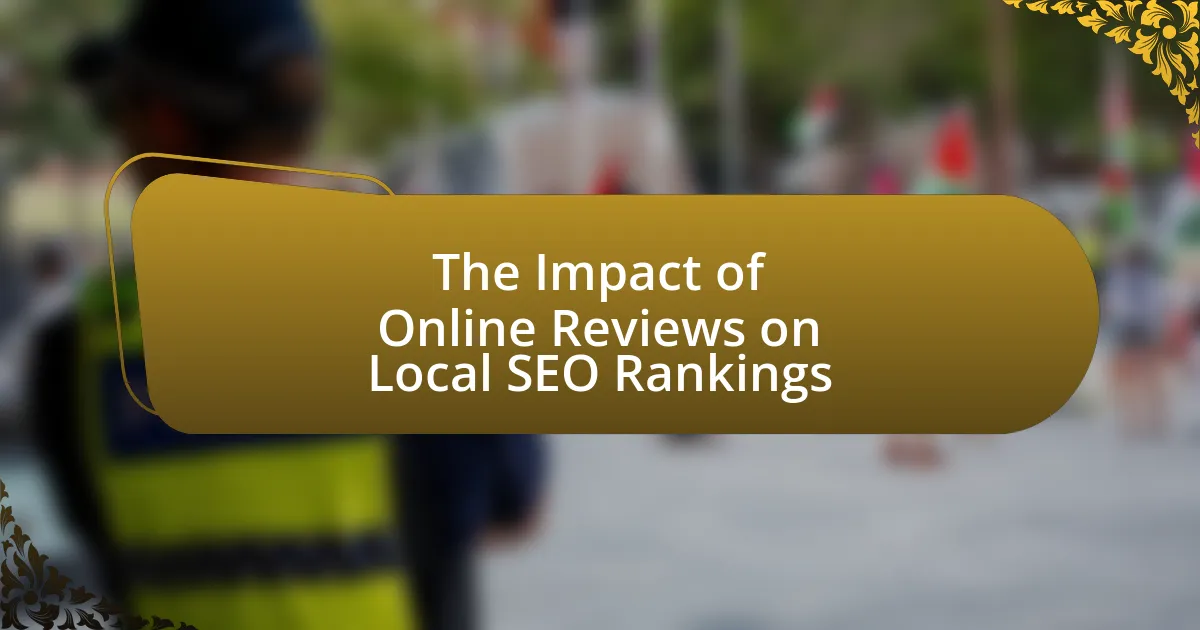The article examines the significant impact of online reviews on local SEO rankings, highlighting their role in enhancing visibility and credibility for businesses. It details how search engines prioritize businesses with positive reviews, which account for approximately 15% of local ranking factors, and discusses the influence of review quantity, quality, and keywords on search visibility. Additionally, the article explores the relationship between customer trust and online reviews, emphasizing the importance of actively managing online reputation to attract more customers and improve local SEO performance. Strategies for encouraging reviews, responding to feedback, and avoiding common pitfalls are also outlined to help businesses leverage online reviews effectively.

What is the Impact of Online Reviews on Local SEO Rankings?
Online reviews significantly influence local SEO rankings by affecting visibility and credibility. Search engines prioritize businesses with positive reviews, as they indicate trustworthiness and relevance to users. According to a study by Moz, online reviews account for approximately 15% of the ranking factors in local search results. Additionally, businesses with higher ratings and more reviews tend to rank better in local search results, as Google considers the quantity and quality of reviews when determining search rankings. This correlation underscores the importance of actively managing online reviews to enhance local SEO performance.
How do online reviews influence local search visibility?
Online reviews significantly influence local search visibility by affecting search engine rankings and user trust. Search engines like Google consider the quantity, quality, and recency of reviews as key ranking factors in local search algorithms. For instance, a study by Moz indicates that online reviews account for approximately 15% of the ranking factors for local SEO, highlighting their importance in determining visibility. Additionally, positive reviews enhance a business’s reputation, leading to higher click-through rates and increased customer engagement, which further boosts local search rankings.
What role do keywords in reviews play in local SEO?
Keywords in reviews significantly enhance local SEO by improving search engine visibility and relevance. When potential customers search for local services, search engines analyze reviews for keywords that match user queries. This keyword alignment helps businesses rank higher in local search results. According to a study by Moz, approximately 13% of local ranking factors are attributed to review signals, which include the presence of relevant keywords. Thus, incorporating targeted keywords in reviews can directly influence a business’s local SEO performance and attract more customers.
How do review ratings affect click-through rates?
Review ratings significantly influence click-through rates by affecting consumer perception and trust. Higher ratings typically lead to increased click-through rates, as consumers are more likely to engage with listings that showcase positive feedback. For instance, a study by BrightLocal found that 87% of consumers read online reviews for local businesses, and 73% of them trust a business more if it has positive reviews. This correlation indicates that favorable review ratings enhance visibility and attractiveness, ultimately driving more clicks to the business’s website or listing.
Why are online reviews important for local businesses?
Online reviews are crucial for local businesses because they significantly influence consumer trust and purchasing decisions. Research indicates that 84% of people trust online reviews as much as personal recommendations, highlighting their impact on consumer behavior. Additionally, positive reviews enhance a business’s visibility in local search results, as search engines prioritize businesses with higher ratings and more reviews. This correlation between online reviews and local SEO rankings underscores the necessity for local businesses to actively manage their online reputation to attract more customers.
What is the relationship between customer trust and online reviews?
Customer trust is significantly influenced by online reviews, as they serve as social proof that can validate a business’s credibility. Research indicates that approximately 79% of consumers trust online reviews as much as personal recommendations, highlighting their importance in shaping perceptions. Positive reviews enhance customer trust by demonstrating satisfaction from previous buyers, while negative reviews can diminish it, leading to potential loss of customers. This relationship underscores the critical role of online reviews in establishing and maintaining customer trust, which is essential for businesses aiming to improve their local SEO rankings.
How do reviews impact consumer decision-making?
Reviews significantly influence consumer decision-making by shaping perceptions of product quality and brand trustworthiness. Research indicates that approximately 79% of consumers trust online reviews as much as personal recommendations, highlighting their critical role in guiding purchasing choices. Furthermore, a study by BrightLocal found that 87% of consumers read online reviews for local businesses, demonstrating that positive reviews can enhance consumer confidence and lead to increased sales. Negative reviews, conversely, can deter potential customers, emphasizing the importance of maintaining a favorable online reputation.

What factors contribute to the effectiveness of online reviews in local SEO?
The effectiveness of online reviews in local SEO is primarily influenced by their quantity, quality, relevance, and recency. A higher number of reviews enhances credibility and signals to search engines that a business is popular, which can improve local rankings. Quality matters as well; positive reviews with detailed feedback are more impactful than generic praise. Relevance to the business type and location also plays a crucial role, as reviews that mention specific services or local landmarks can boost visibility in local search results. Additionally, recent reviews are favored by search algorithms, as they indicate that the business is actively engaging with customers. Research by Moz indicates that online reviews account for approximately 15% of local search ranking factors, underscoring their significance in local SEO strategies.
How does the quantity of reviews affect local SEO rankings?
The quantity of reviews significantly impacts local SEO rankings by influencing both visibility and credibility. Search engines, particularly Google, prioritize businesses with a higher number of positive reviews, as they are perceived to be more trustworthy and relevant to users. According to a study by Moz, review signals, including the quantity of reviews, account for approximately 15% of local search ranking factors. This correlation indicates that businesses with more reviews are likely to rank higher in local search results, thereby attracting more potential customers.
What is the significance of having a high number of reviews?
Having a high number of reviews significantly enhances a business’s credibility and visibility in local SEO rankings. A substantial volume of reviews signals to search engines that the business is reputable and trusted by customers, which can lead to improved rankings in local search results. According to a study by BrightLocal, 87% of consumers read online reviews for local businesses, and businesses with a higher number of positive reviews tend to attract more customers. This correlation between review quantity and local SEO performance underscores the importance of actively encouraging customer feedback to boost online presence and attract potential clients.
How does review frequency influence ranking algorithms?
Review frequency significantly influences ranking algorithms by indicating the relevance and popularity of a business. Higher review frequency typically correlates with improved visibility in search results, as algorithms prioritize businesses that demonstrate active customer engagement. For instance, a study by Moz in 2021 highlighted that businesses with a higher volume of recent reviews tend to rank better in local search results, as search engines interpret frequent reviews as a sign of trustworthiness and customer satisfaction. This relationship underscores the importance of maintaining an ongoing stream of customer feedback to enhance local SEO performance.
What is the impact of review quality on local SEO?
Review quality significantly influences local SEO rankings. High-quality reviews enhance a business’s visibility in local search results, as search engines prioritize businesses with positive, detailed, and relevant feedback. According to a study by Moz, review signals, including quantity and quality, account for approximately 15% of local search ranking factors. This indicates that businesses with higher-rated reviews are more likely to appear at the top of local search results, driving more traffic and potential customers. Additionally, positive reviews can improve click-through rates and customer trust, further solidifying a business’s position in local SEO.
How do detailed reviews enhance local search rankings?
Detailed reviews enhance local search rankings by increasing the relevance and authority of a business in local search results. Search engines prioritize businesses with comprehensive, positive reviews because they indicate customer satisfaction and trustworthiness. According to a study by Moz, reviews account for approximately 15% of local ranking factors, with detailed reviews providing more context and keywords that align with user search queries. This specificity helps search engines better understand the business’s offerings and improves visibility in local search results.
What types of reviews are most beneficial for SEO?
The types of reviews most beneficial for SEO are those that are detailed, authentic, and contain relevant keywords. Detailed reviews provide specific insights about products or services, which can enhance user engagement and increase the likelihood of conversion. Authentic reviews, particularly those that reflect genuine customer experiences, build trust and credibility, factors that search engines consider when ranking content. Additionally, reviews that include relevant keywords help improve visibility in search results, as they align with the search intent of potential customers. According to a study by BrightLocal, 91% of consumers read online reviews, and 84% trust them as much as personal recommendations, highlighting the significant impact of reviews on local SEO rankings.

How can businesses leverage online reviews to improve their local SEO?
Businesses can leverage online reviews to improve their local SEO by actively encouraging satisfied customers to leave positive feedback on platforms like Google My Business, Yelp, and Facebook. Positive reviews enhance a business’s visibility in local search results, as search engines prioritize businesses with higher ratings and more reviews. According to a study by BrightLocal, 87% of consumers read online reviews for local businesses, and 73% trust a business more if it has positive reviews. Additionally, responding to reviews, both positive and negative, can further boost engagement and signal to search engines that the business is active and customer-focused, which can improve local rankings.
What strategies can businesses implement to encourage more reviews?
Businesses can implement several strategies to encourage more reviews, including requesting feedback directly from customers, offering incentives, and simplifying the review process. Directly asking customers for reviews, especially after a positive interaction, can significantly increase the likelihood of receiving feedback. Research indicates that 70% of customers will leave a review if asked (BrightLocal, 2022). Offering incentives, such as discounts or loyalty points, can motivate customers to share their experiences, as long as the incentives comply with platform guidelines. Additionally, simplifying the review process by providing clear instructions and links can reduce barriers for customers, leading to a higher volume of reviews.
How can businesses effectively ask for reviews from customers?
Businesses can effectively ask for reviews from customers by timing their requests strategically, such as shortly after a purchase or service experience. This approach leverages the positive emotions customers feel immediately after a transaction, increasing the likelihood of receiving favorable feedback. Research indicates that 70% of customers will leave a review if asked, particularly when the request is personalized and delivered through convenient channels like email or SMS. Additionally, providing clear instructions on how to leave a review can enhance participation rates, as customers appreciate guidance.
What platforms are best for collecting online reviews?
The best platforms for collecting online reviews include Google My Business, Yelp, Facebook, and Trustpilot. Google My Business is essential as it directly influences local SEO rankings, with 46% of all Google searches seeking local information. Yelp is widely recognized for its user-generated reviews, particularly in the restaurant and service industries, enhancing visibility and credibility. Facebook allows businesses to engage with customers and gather reviews, leveraging its vast user base. Trustpilot specializes in collecting reviews for e-commerce and service-based businesses, providing a trusted platform for consumer feedback. Each of these platforms plays a significant role in shaping a business’s online reputation and local search visibility.
How should businesses respond to online reviews to boost SEO?
Businesses should respond to online reviews by engaging with customers, addressing their concerns, and thanking them for their feedback. This practice not only enhances customer relationships but also signals to search engines that the business is active and responsive, which can positively influence local SEO rankings. According to a study by Moz, online reviews account for approximately 15% of local search ranking factors, indicating that timely and thoughtful responses can improve visibility in search results. Additionally, responding to reviews can generate more user-generated content, which search engines favor, further boosting SEO performance.
What are the best practices for responding to positive reviews?
The best practices for responding to positive reviews include expressing gratitude, personalizing the response, and encouraging further engagement. Businesses should thank the reviewer for their feedback, which fosters a positive relationship and shows appreciation. Personalizing the response by mentioning specific details from the review demonstrates attentiveness and builds rapport. Encouraging further engagement, such as inviting the reviewer to return or share their experience on social media, can enhance customer loyalty and visibility. These practices not only strengthen customer relationships but also positively influence local SEO rankings by increasing engagement and interaction with the brand.
How should businesses handle negative reviews to maintain SEO rankings?
Businesses should respond promptly and professionally to negative reviews to maintain SEO rankings. Engaging with customers demonstrates active management of online reputation, which can positively influence search engine algorithms. According to a study by BrightLocal, 89% of consumers read responses to reviews, indicating that businesses that address negative feedback can improve customer trust and potentially mitigate the impact of negative reviews on their SEO. Additionally, encouraging satisfied customers to leave positive reviews can help balance the overall rating, further enhancing local SEO performance.
What are the common pitfalls to avoid regarding online reviews and local SEO?
Common pitfalls to avoid regarding online reviews and local SEO include neglecting to respond to reviews, failing to encourage customer feedback, and not monitoring review platforms. Neglecting to respond to reviews can lead to a negative perception of the business, as 53% of customers expect businesses to respond to reviews within a week. Failing to encourage customer feedback limits the volume of reviews, which is crucial since businesses with more reviews tend to rank higher in local search results. Not monitoring review platforms can result in missed opportunities to address negative feedback, which can harm a business’s reputation and local SEO performance.
What mistakes can harm a business’s online reputation?
Mistakes that can harm a business’s online reputation include ignoring customer feedback, responding poorly to negative reviews, and failing to maintain an active online presence. Ignoring customer feedback can lead to unresolved issues, which may escalate and result in negative reviews. Poor responses to negative reviews, such as being defensive or dismissive, can further alienate customers and damage the business’s image. Additionally, a lack of engagement on social media or review platforms can create the perception that the business does not value its customers, leading to a decline in trust and credibility. According to a study by BrightLocal, 87% of consumers read online reviews for local businesses, highlighting the importance of managing online reputation effectively.
How can businesses avoid fake reviews and their consequences?
Businesses can avoid fake reviews by implementing strict verification processes for customer feedback and actively monitoring their online reputation. By requiring proof of purchase or service before allowing a review, businesses can ensure that only legitimate customers contribute feedback. Additionally, utilizing software tools that analyze review patterns can help identify suspicious activity, such as multiple reviews from the same IP address or overly generic language. According to a 2021 survey by BrightLocal, 82% of consumers read online reviews for local businesses, highlighting the importance of maintaining authenticity in reviews to protect brand reputation and SEO rankings.
What practical tips can businesses follow to maximize the impact of online reviews on local SEO?
To maximize the impact of online reviews on local SEO, businesses should actively encourage customers to leave reviews, respond promptly to all reviews, and maintain a consistent presence across multiple review platforms. Actively soliciting reviews can increase the volume of feedback, which is a key factor in local search rankings; studies show that businesses with more reviews tend to rank higher in local search results. Responding to reviews, whether positive or negative, demonstrates engagement and can enhance customer trust, which is beneficial for SEO. Additionally, ensuring that business information is consistent across platforms helps search engines verify the legitimacy of the business, further improving local SEO performance.

Leave a Reply